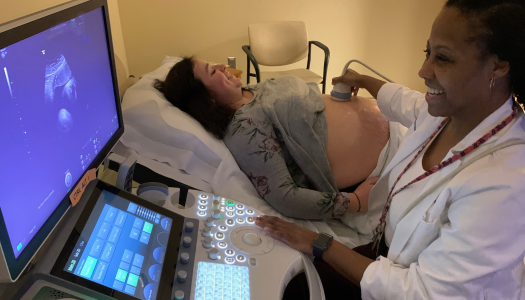Duke High-Risk Obstetrics Clinic, located within Duke Perinatal Consultants of Durham and Fetal Diagnostic Center, recently added cardiology services to the lineup of specialties. This addition establishes Duke’s first multispecialty clinic for high-risk pregnancies.
The groundbreaking model of care was spearheaded by the Division of Maternal-Fetal Medicine within the Department of Obstetrics and Gynecology, with the goal to improve the quality of care available and convenient access for Duke’s high-risk obstetrical patients—a patient base largely seen by the same specialty providers, all of which traditionally practiced in different physical locations.
“Many high-risk pregnancies have complications that require care from multiple sub-specialists, such as hematologists (for managing blood disorders), endocrinologists (to manage pre-gestational diabetes and complex endocrine disorders), cardiologists (for maternal and/or fetal cardiac disorders), and anesthesiologists (for complex deliveries), among others,” says Brenna Hughes, MD, MSc, Division Chief of Maternal-Fetal Medicine “The traditional model of referring patients out to other specialty clinics can be problematic because it requires additional travel and more cross-clinical communication—both of which can create hurdles for patients and providers.”
Prior to implementing the new model of care, Alice Cooper, OGNP, RNC, Medical Director for Women’s Ambulatory Services, had seen an increase in the rate of no-shows when high-risk patients were referred to other specialties. Cooper and a team of colleagues set out to determine the cause and discovered that difficult parking, long walks or access problems were the drivers. Not only were these issues leading to no-shows, but they were also tied to a decrease in patient satisfaction.
“The goal was to improve patient safety and satisfaction by providing these services in one convenient location, without competing with existing specialty services,” says Cooper. “The idea was well-received by patients and with our specialist colleagues with whom most of the crossover occurred, empowering us to bring the vision to life.”
The first specialist to pilot the embedded model was obstetrical anesthesiologist Ashraf Habib, MD, who provided consultation to patients who would likely require anesthesia services during delivery. This partnership soon expanded to include endocrinologist Tracy Setji, MD, who began helping patients manage cases of diabetes, and Andra James, MD, MPH, maternal-fetal medicine specialist and hematologist, who provided care for patients with blood disorders. Each embedded specialty began offering clinic days once monthly to existing patients.
"Our integration of subspecialty care and consultation for the multidisciplinary care of pregnant women allow women with complex medical problems to get conveniently and safely through pregnancy,” notes Dr. James.
In September, cardiology became the latest specialty to offer onsite services when cardiologists Cary Ward, MD, and Sarah Goldstein, MD, began offering monthly clinic to patients.
“Before Drs. Ward and Goldstein partnered with us, we had such great demand for cardiac diagnostics that we bought an EKG machine, trained certified medical assistants to operate it, and sent the results offsite to be studied,” says Cooper. “This process was far too clunky to effectively meet the growing demand within our patient population. Having cardiology embedded as an onsite service has vastly improved the efficiency and convenience of care.”
“By bringing the medical sub-specialists into our clinic, we are able to provide more patient-centered, team-based, multidisciplinary care, which is really the gold-standard for our patients,” says Dr. Hughes. “The efforts of Alice [Cooper] and others has made a huge difference in the quality of care we offer patients.”
The new approach to high-risk care also grabbed the attention of the North Carolina Health Department’s Pregnancy Medical Home, which allowed its nurses and social work resources to be embedded in the clinic. This partnership significantly increased patient access to services, such as in-home visits, transportation assistance, and substance abuse support. Additional services provided in the clinic include patient education on personal care during high-risk pregnancy, postpartum care and breastfeeding, as well as resources for families during and after pregnancy.
“We want to meet our patients where they are and provide care that truly addresses their needs,” says Cooper. “The health and well-being of our patients and families within and outside of our community are what really matters most and because of them, we are collaborating, innovating, and evolving like never before. Good healthcare is inclusive and thoughtful and that’s what we strive to provide our patients.”
Duke providers who wish to refer current patients into Duke High-Risk Obstetrics Clinic may do so via Maestro Care referral to “Duke Perinatal Durham (HROB)” or by instructing current patients to schedule a high-risk obstetrics consultation at 919-684-6327.
